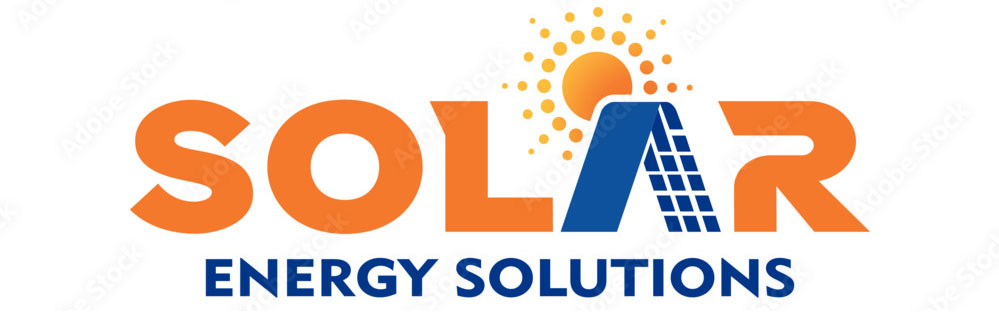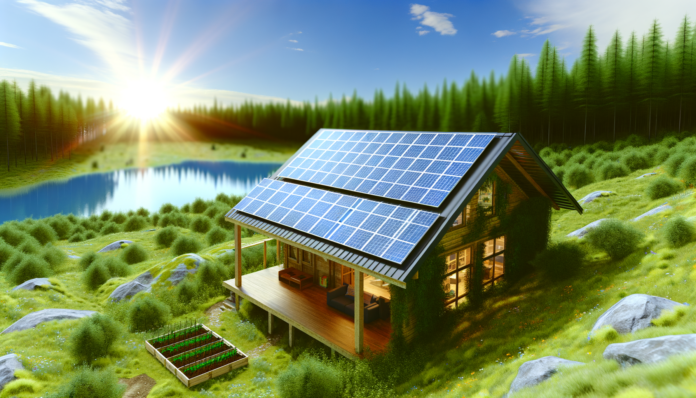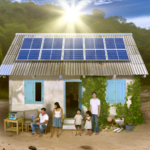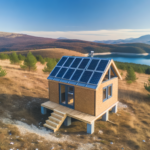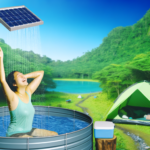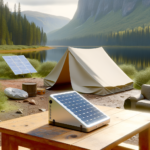Introduction to Off-Grid Living
What is Off-Grid Living?
Off-grid living refers to a lifestyle that is independent of public utilities, such as electricity, water, and sewage systems. It is a deliberate move towards self-sufficiency and environmental consciousness. While the term “off-grid” technically pertains to energy systems that are not connected to the electrical grid, it is often used more broadly to describe a way of life that minimizes reliance on mainstream society for basic needs like food, water, and shelter. This lifestyle is increasingly accessible thanks to advancements in sustainable technologies, such as solar energy and tiny home innovations.
Benefits of Living Off-Grid
Living off-grid offers numerous benefits that extend beyond mere independence from public utilities. Here are some key advantages:
- Self-Sufficiency: One of the most compelling aspects of off-grid living is the ability to be self-reliant. You generate your own power, collect your own water, and grow your own food, reducing your dependence on external systems.
- Environmental Impact: By utilizing renewable energy sources like solar power, you significantly reduce your carbon footprint. This lifestyle promotes sustainable living practices that are beneficial for the planet.
- Financial Savings: Although the initial setup costs can be high, the long-term savings are substantial. You eliminate monthly utility bills and can even generate income by selling excess energy back to the grid in some cases.
- Quality of Life: Off-grid living often leads to a simpler, more fulfilling lifestyle. It allows you to reconnect with nature, spend more time with family, and enjoy the freedom of living on your own terms.
Challenges and Considerations
While the benefits are numerous, off-grid living also comes with its own set of challenges and considerations:
- Initial Investment: Setting up an off-grid system can be expensive. Costs include purchasing land, installing solar panels, setting up water systems, and building a home. However, these are often one-time expenses that pay off in the long run.
- Maintenance: Off-grid systems require regular maintenance to ensure they function efficiently. This includes cleaning solar panels, checking battery health, and maintaining water systems.
- Resource Management: Living off-grid means you need to be mindful of your resource consumption. This includes monitoring your energy use, water supply, and food production to ensure sustainability.
- Legal and Zoning Issues: Not all areas are zoned for off-grid living. It’s crucial to research local laws and regulations to ensure you can legally live off-grid on your chosen property.
- Isolation: Off-grid living often means being far from urban areas, which can lead to feelings of isolation. It’s important to consider your social needs and how you will stay connected with friends and family.
In summary, off-grid living is a lifestyle choice that offers numerous benefits, including self-sufficiency, environmental sustainability, and financial savings. However, it also requires careful planning, significant initial investment, and ongoing maintenance. For those willing to embrace the challenges, the rewards can be life-changing.
Understanding Solar Energy
How Solar Energy Works
Solar energy harnesses the power of the sun to generate electricity. This process primarily involves photovoltaic (PV) cells, which are the core components of solar panels. When sunlight hits these cells, it excites electrons, creating an electric current. This phenomenon is known as the photovoltaic effect. The generated direct current (DC) electricity is then converted into alternating current (AC) by an inverter, making it suitable for household use. Solar energy is a clean, renewable source that can be utilized almost anywhere, making it an ideal solution for off-grid living.
Types of Solar Power Systems
There are several types of solar power systems, each suited to different needs and applications:
- Photovoltaic (PV) Systems: These systems convert sunlight directly into electricity using solar panels. They are the most common type for residential and off-grid applications.
- Solar Thermal Systems: These systems capture and use the sun’s heat for water heating, space heating, or even cooling. They are less common for electricity generation but are highly efficient for thermal energy needs.
- Hybrid Systems: These combine PV and solar thermal technologies to maximize energy efficiency and versatility. They can provide both electricity and thermal energy, making them suitable for comprehensive off-grid setups.
Advantages of Solar Energy for Off-Grid Living
Solar energy offers numerous benefits for those looking to live off the grid:
- Reliability: Solar systems provide a consistent energy supply as long as there is sunlight, which is available almost daily in many parts of the world.
- Sustainability: Solar energy is a renewable resource that significantly reduces carbon footprints and environmental impact. It promotes a sustainable lifestyle by utilizing a natural and inexhaustible energy source.
- Cost-Effectiveness: After the initial investment in solar panels and equipment, the ongoing costs are minimal compared to conventional energy sources. This makes solar energy a financially sound long-term option.
- Independence: Solar energy provides autonomy from utility companies, freeing off-grid dwellers from the unpredictability of utility prices and availability. This independence is a key aspect of the off-grid lifestyle.
- Low Maintenance: Solar power systems require relatively low maintenance. Regular cleaning and occasional inspections are usually sufficient to keep the system running efficiently.
By understanding how solar energy works, the types of systems available, and the advantages it offers, you can make informed decisions about integrating solar power into your off-grid living setup. This knowledge is crucial for achieving energy independence and sustainability in your off-grid journey.
Setting Up Your Solar Power System
Assessing Your Energy Needs
Before diving into the setup of your solar power system, it’s crucial to understand your energy requirements. Start by listing all the appliances and devices you plan to use, along with their wattage and estimated usage hours. Multiply the wattage by the usage hours to calculate the total energy consumption in watt-hours (Wh). This will help you determine the size of the solar power system you need.
For example, if you have a refrigerator that uses 100 watts and runs for 10 hours a day, it consumes 1000 Wh daily. Summing up the energy consumption of all your devices will give you a clear picture of your total energy needs. Additionally, consider seasonal variations and potential future expansions to ensure your system can handle increased demand.
Choosing the Right Solar Panels
Selecting the appropriate solar panels is a critical step in setting up your off-grid system. There are several types of solar panels to choose from, including monocrystalline, polycrystalline, and thin-film panels. Each type has its own efficiency ratings and cost factors.
- Monocrystalline Panels: Known for their high efficiency and sleek appearance, these panels are ideal for limited space but come at a higher cost.
- Polycrystalline Panels: More affordable with slightly lower efficiency, these panels are a good balance between cost and performance.
- Thin-Film Panels: Flexible and lightweight, these panels are less efficient but can be useful for irregular surfaces.
When choosing solar panels, consider factors such as efficiency, durability, and warranty. High-efficiency panels may have a higher upfront cost but will generate more electricity over their lifespan, making them a worthwhile investment.
Selecting Batteries and Inverters
Batteries and inverters are essential components of an off-grid solar power system. Batteries store the electricity generated by the solar panels for use during non-sunny periods, while inverters convert the stored direct current (DC) into alternating current (AC) for household use.
- Batteries: Deep-cycle batteries, such as lithium-ion and lead-acid batteries, are commonly used in off-grid systems. Lithium-ion batteries are more efficient and have a longer lifespan but are more expensive. Lead-acid batteries are more affordable but require regular maintenance.
- Inverters: Choose between pure sine wave and modified sine wave inverters. Pure sine wave inverters provide cleaner power and are compatible with all electronic devices, while modified sine wave inverters are cheaper but may not work well with certain appliances.
Ensure that the battery capacity matches your energy needs and that the inverter’s wattage rating can handle the total load of your devices.
Installation and Maintenance Tips
Proper installation and regular maintenance are key to the efficiency and longevity of your solar power system.
Installation Tips:
- Mounting the Panels: Install solar panels in a location with maximum sunlight exposure. Tilt the panels at an optimal angle for your latitude to maximize energy capture.
- Wiring the System: Use appropriate gauges and connectors for wiring. Follow the manufacturer’s instructions carefully, and consider hiring a professional electrician for complex installations.
- Setting Up Components: Connect the solar panels to the charge controller, then link the charge controller to the battery bank. Finally, connect the inverter to the battery bank and wire it to your home’s electrical panel.
Maintenance Tips:
- Cleaning the Panels: Regularly clean the solar panels to remove dust, dirt, and debris that can reduce efficiency.
- Checking Battery Health: Monitor the batteries for signs of wear and tear. Ensure they are properly charged and avoid deep discharges to extend their lifespan.
- Inspecting Wiring and Connections: Regularly check all wiring and connections for damage or corrosion. Tighten any loose connections and replace damaged parts promptly.
By carefully assessing your energy needs, choosing the right components, and following proper installation and maintenance practices, you can set up an efficient and reliable off-grid solar power system.
Maximizing Efficiency and Sustainability
Energy-Saving Tips for Off-Grid Living
Living off-grid requires a keen focus on energy efficiency to ensure that your solar power system can meet your needs without overburdening it. Here are some essential tips to help you save energy:
- Use Energy-Efficient Appliances: Opt for appliances that have high energy efficiency ratings. Look for Energy Star-rated products, which consume less power and are designed to be more efficient.
- LED Lighting: Replace incandescent bulbs with LED lights. LEDs use significantly less energy and have a longer lifespan.
- Unplug Devices: Many electronics consume power even when turned off. Unplug devices when not in use or use power strips to easily disconnect multiple devices at once.
- Insulate Your Home: Proper insulation reduces the need for heating and cooling, thereby saving energy. Focus on insulating walls, roofs, and floors.
- Optimize Sunlight: Use natural light during the day to reduce the need for artificial lighting. Design your home with large windows and skylights to maximize sunlight exposure.
Integrating Other Renewable Energy Sources
While solar energy is a fantastic primary source for off-grid living, integrating other renewable energy sources can enhance reliability and efficiency. Here are some options to consider:
- Wind Energy: Wind turbines can complement solar panels, especially in areas with consistent wind. They can generate power during cloudy or nighttime conditions when solar panels are less effective.
- Hydro Power: If you have access to a flowing water source, a micro-hydro system can provide a steady and reliable energy supply. This is particularly useful in regions with abundant water resources.
- Biomass Energy: Biomass systems, such as wood-burning stoves or biogas digesters, can provide heating and cooking energy. These systems utilize organic materials, making them a sustainable option.
Sustainable Living Practices
Adopting sustainable living practices is crucial for maintaining an off-grid lifestyle. Here are some practices to help you live more sustainably:
- Water Conservation: Implement rainwater harvesting systems and use water-efficient fixtures to reduce water consumption. Recycle greywater for irrigation and other non-potable uses.
- Composting: Composting organic waste reduces landfill use and provides nutrient-rich soil for gardening. Use composting toilets to manage human waste sustainably.
- Grow Your Own Food: Establish a garden to grow fruits, vegetables, and herbs. This reduces your reliance on external food sources and ensures a fresh, organic supply.
- Reduce, Reuse, Recycle: Minimize waste by reducing consumption, reusing materials, and recycling whenever possible. This helps conserve resources and reduces your environmental footprint.
- Eco-Friendly Building Materials: Use sustainable and locally-sourced materials for construction and renovations. Materials like bamboo, reclaimed wood, and recycled metal are excellent choices.
By implementing these energy-saving tips, integrating multiple renewable energy sources, and adopting sustainable living practices, you can maximize the efficiency and sustainability of your off-grid lifestyle. This holistic approach not only ensures a reliable energy supply but also promotes environmental stewardship and self-sufficiency.
Case Studies and Real-Life Examples
Successful Off-Grid Solar Setups
Off-grid solar systems have been successfully implemented in various settings, showcasing their versatility and effectiveness. Here are a few notable examples:
The Village of XYZ: Located in a remote mountainous region, the village of XYZ faced significant challenges in accessing reliable electricity. Prior to the installation of an off-grid solar system, residents relied on expensive and unreliable kerosene lamps for lighting. The introduction of solar panels and battery storage transformed their lives, providing consistent and clean electricity for lighting, cooking, and powering small appliances. This setup not only improved the quality of life but also reduced the village’s carbon footprint.
Antarctic Research Station: In one of the most extreme environments on Earth, a remote research station in Antarctica relies on an off-grid solar system for its energy needs. The harsh weather conditions and the absence of a traditional power grid necessitated a self-sufficient energy solution. The off-grid solar system, complemented by a backup generator, ensures a reliable source of electricity for scientific research and daily operations, demonstrating the robustness and reliability of solar technology in even the most challenging conditions.
Rural Farm in ABC: A small farm in a rural area implemented an off-grid solar system to power its irrigation system and farm equipment. This setup allowed the farmer to significantly reduce energy costs and become more self-sufficient. Additionally, the off-grid solar system aligned with the farmer’s commitment to sustainable agriculture by reducing the farm’s carbon footprint. The success of this project highlights the potential for off-grid solar systems to support sustainable farming practices.
Lessons Learned from Off-Grid Pioneers
The experiences of early adopters of off-grid solar systems provide valuable insights and lessons for those considering similar setups:
- Proper Assessment of Energy Needs: One of the critical lessons learned is the importance of accurately assessing energy needs before designing and installing an off-grid solar system. This involves understanding daily electricity consumption, peak demand, and the number of sunlight hours available. Proper assessment ensures that the system is appropriately sized to meet energy requirements, avoiding power shortages and maximizing efficiency.
- Quality Components Matter: Investing in high-quality solar panels, batteries, and inverters is crucial for the long-term success of an off-grid solar system. While the initial cost may be higher, quality components are more reliable, require less maintenance, and have a longer lifespan, ultimately providing better value for money.
- Regular Maintenance is Key: Regular maintenance of the solar panels, batteries, and other components is essential to ensure optimal performance and longevity. This includes cleaning the panels, checking battery levels, and inspecting wiring and connections. Proactive maintenance helps prevent issues and ensures a continuous power supply.
- Backup Solutions: Having a backup generator or an alternative energy source can be a lifesaver during extended periods of low sunlight or high energy demand. This ensures that there is always a reliable source of electricity, even in less-than-ideal conditions.
- Community Involvement and Training: In community-based projects, involving local residents in the planning and maintenance of the off-grid solar system can enhance its success. Providing training on basic maintenance and troubleshooting empowers the community to take ownership of the system and ensures its sustainability.
These case studies and lessons learned underscore the potential of off-grid solar systems to provide reliable, sustainable, and cost-effective energy solutions in diverse settings. By learning from the experiences of off-grid pioneers, new adopters can better navigate the challenges and maximize the benefits of their solar installations.
Troubleshooting and Problem-Solving
Common Issues and Solutions
Living off-grid with a solar power system can be incredibly rewarding, but it also comes with its own set of challenges. Here are some common issues you might encounter and their solutions:
- Low Power Output: If your solar panels are not generating enough power, it could be due to several factors such as shading, dirt, or incorrect panel orientation. Ensure that your panels are clean and free from obstructions. Adjust the tilt and orientation to maximize sunlight exposure.
- Battery Not Charging: If your batteries are not charging, check the connections between the solar panels, charge controller, and batteries. Ensure that all connections are secure and free from corrosion. Also, verify that the charge controller settings are correctly configured for your battery type.
- Inverter Issues: If your inverter is not working, it could be due to a blown fuse, low battery voltage, or an overload. Check the fuse and replace it if necessary. Ensure that your batteries are adequately charged and that the inverter is not overloaded with too many appliances.
- System Overheating: Overheating can occur if your system components are not adequately ventilated. Ensure that your inverter, charge controller, and batteries are placed in a well-ventilated area. Use fans or cooling systems if necessary to maintain optimal temperatures.
- Monitoring System Failures: If your monitoring system is not providing accurate data, check the connections and software settings. Ensure that the monitoring devices are correctly installed and configured. Update the software to the latest version to fix any bugs or issues.
When to Seek Professional Help
While many issues can be resolved with basic troubleshooting, some situations require professional assistance. Here are some scenarios where you should consider seeking help from a qualified technician:
- Persistent Power Issues: If you have tried all troubleshooting steps and still face power generation or storage issues, it’s time to call a professional. They can perform a thorough inspection and identify any underlying problems.
- Electrical Hazards: If you notice any signs of electrical hazards such as sparks, burning smells, or exposed wires, immediately turn off your system and contact a professional. Electrical issues can be dangerous and should be handled by experts.
- Component Failures: If any major component such as the inverter, charge controller, or batteries fail, it’s best to have a professional assess and replace the faulty parts. They can ensure that the new components are correctly installed and integrated into your system.
- System Upgrades: If you plan to upgrade your system by adding more solar panels, batteries, or other components, consulting a professional can help you design and implement the upgrades efficiently. They can ensure that your system remains balanced and operates optimally.
- Compliance and Safety Checks: Regular compliance and safety checks by a professional can help you maintain your system’s efficiency and safety. They can identify potential issues before they become major problems and ensure that your system complies with local regulations.
By addressing common issues promptly and knowing when to seek professional help, you can ensure that your off-grid solar power system remains reliable and efficient, providing you with sustainable energy for years to come.
Future Trends in Solar Energy and Off-Grid Living
Innovations in Solar Technology
The field of solar technology is rapidly evolving, bringing forth innovations that make off-grid living more efficient and accessible. **Bifacial solar panels**, which capture sunlight on both sides, are becoming increasingly popular due to their higher energy yield. Additionally, **perovskite solar cells** are emerging as a promising alternative to traditional silicon-based cells, offering higher efficiency and lower production costs.
Another exciting development is the advent of **solar skins**—customizable solar panels that blend seamlessly with the aesthetics of your home. These innovations not only enhance the efficiency of solar energy systems but also make them more appealing and versatile for various applications.
The Growing Popularity of Off-Grid Living
Off-grid living is no longer a fringe lifestyle choice; it is becoming a mainstream movement. The increasing awareness of environmental issues and the desire for energy independence are driving more people to explore off-grid options. According to recent surveys, a significant percentage of homeowners are considering off-grid solutions to reduce their carbon footprint and utility bills.
Moreover, the rise of **tiny homes** and **van life** culture has contributed to the popularity of off-grid living. These compact, mobile living spaces are often powered by solar energy, making them ideal for those seeking a minimalist and sustainable lifestyle. The growing availability of DIY solar kits and online resources has also made it easier for individuals to set up their own off-grid systems.
How to Stay Updated on Solar Energy Advancements
Staying informed about the latest advancements in solar energy is crucial for anyone interested in off-grid living. Here are some ways to keep up-to-date:
- **Subscribe to Industry Newsletters**: Many organizations and websites offer newsletters that provide updates on the latest trends and technologies in solar energy.
- **Join Online Communities**: Platforms like Reddit, Facebook groups, and specialized forums are excellent places to share experiences and learn from others in the off-grid community.
- **Attend Webinars and Conferences**: Many industry experts host webinars and conferences that delve into new technologies and best practices for solar energy systems.
- **Follow Influential Blogs and YouTube Channels**: Many experts and enthusiasts share their knowledge and experiences through blogs and YouTube channels, offering valuable insights and tutorials.
By leveraging these resources, you can stay ahead of the curve and make informed decisions about your off-grid solar energy system. The future of solar energy and off-grid living is bright, and staying updated will help you harness its full potential.

